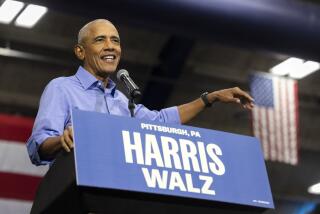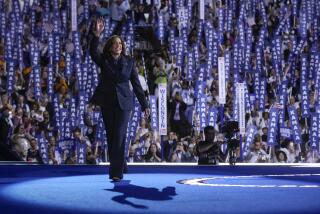Moving a nation
It may have begun as an exercise in political damage control, but Barack Obama’s speech in Philadelphia on “A More Perfect Union” was that rarity in American political discourse: a serious discussion of racial division, distrust and demonization. Whether or not the speech defuses the controversy about some crackpot comments by Obama’s longtime pastor, it redefines our national conversation about race and politics and lays down a challenge to the cynical use of the “race card.”
When the Illinois senator took the podium Tuesday at the National Constitution Center, he already had condemned a series of inflammatory statements by his friend and mentor, the Rev. Jeremiah A. Wright Jr. In his speech, Obama reiterated his view that some of Wright’s comments were “not only wrong but divisive.”
That description certainly applies to Wright’s suggestion that “God damn America” is a more appropriate sentiment than “God bless America” and his assertion that the 9/11 attacks represented the “chickens coming home to roost” for a racist society that dropped nuclear bombs on Japan and helped to oppress Palestinians and black South Africans. (9/11 seems to bring out the demagogue in preachers on both the right and the left. Pat Robertson and the late Jerry Falwell famously portrayed the attacks as divine retribution for the abominations of legal abortion, feminism and gay rights.)
But in his speech, Obama also offered a context that explained (without excusing) Wright’s ravings: “For the men and women of Rev. Wright’s generation, the memories of humiliation and doubt and fear have not gone away; nor has the anger and the bitterness of those years. That anger may not get expressed in public, in front of white co-workers or white friends. But it does find voice in the barbershop or around the kitchen table.”
This is the sort of blunt language that is seldom heard in stump speeches by politicians of any race. And Obama was equally direct in pointing out that fulminations like Wright’s have an analogue in the angry utterances of white Americans who believe -- and are encouraged by politicians to believe -- that their interests are threatened by progress for African Americans. He noted that these resentments as well “aren’t always expressed in polite company. But they have helped shape the political landscape for at least a generation.”
That landscape has claimed many victims, and as he and Hillary Rodham Clinton continue their contest for the Democratic nomination, Obama conceded that some of the crasser remarks by their supporters some crackpot comments “reflect the complexities of race in this country that we’ve never really worked through -- a part of our union that we have yet to perfect.” That is undeniably true and refreshingly honest. No single speech will recalibrate America’s consideration of race and politics, but we are closer today, thanks to this remarkable address, to facing our history and perfecting our nation.
More to Read
Get the L.A. Times Politics newsletter
Deeply reported insights into legislation, politics and policy from Sacramento, Washington and beyond. In your inbox three times per week.
You may occasionally receive promotional content from the Los Angeles Times.










